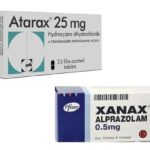Does Xanax Help With Nausea?

Nausea is a sensation of discomfort or unease in the stomach often accompanied by an inclination to vomit. It is a common symptom rather than a standalone condition and can be caused by various factors. Some common causes of nausea include:
1. Gastrointestinal Issues: Nausea can be related to problems in the digestive system, such as indigestion, food poisoning, stomach viruses, or gastroesophageal reflux disease (GERD).
2. Motion Sickness: Some people experience nausea when traveling, especially in cars, boats, or airplanes. This is known as motion sickness.
3. Pregnancy: Nausea and vomiting, often referred to as morning sickness, are common symptoms during pregnancy, particularly in the first trimester.
4. Medications: Certain medications, such as chemotherapy drugs or opioid pain relievers, can lead to nausea as a side effect.
5. Infections: Viral or bacterial infections, such as the flu or foodborne illnesses, can cause nausea as the body’s defense mechanism to expel harmful substances.
6. Migraines: Nausea is a common symptom of migraines, often occurring alongside severe headaches.
7. Emotional and Psychological Factors: Stress, anxiety, and psychological disorders can sometimes trigger feelings of nausea.
8. Overeating or Eating Disorders: Consuming large quantities of food or having an eating disorder can lead to nausea and discomfort.
9. Alcohol and Hangovers: Excessive alcohol consumption can irritate the stomach lining and result in nausea, which is often experienced as part of a hangover.
10. Underlying Medical Conditions: Chronic conditions like gastritis, ulcers, or pancreatitis can cause ongoing or recurrent nausea.
To address nausea, treatment typically focuses on addressing the underlying cause. In this article, we will explore the relationship between Xanax and nausea, as well as the potential benefits and considerations associated with its use for this purpose.
What is Xanax?
Xanax, also known by its generic name alprazolam, is a prescription medication classified as a benzodiazepine. It is primarily prescribed to manage anxiety disorders and panic disorders, but it can also be used for short-term treatment of insomnia, certain types of seizures, and alcohol withdrawal symptoms. Xanax is recognized for its fast-acting properties, often delivering relief from anxiety symptoms within 20 to 30 minutes after ingestion. It achieves its effects by enhancing the activity of gamma-aminobutyric acid (GABA), a neurotransmitter in the brain responsible for inhibiting nerve activity. By increasing GABA’s influence, Xanax promotes relaxation, reduces anxiety, and induces muscle relaxation.
Xanax for Nausea
While Xanax is not typically prescribed as a first-line treatment for nausea, it can indirectly help alleviate nausea in certain situations:
1. Anxiety-Induced Nausea: Nausea is a common symptom of anxiety and panic disorders. Individuals experiencing intense anxiety may also experience stomach discomfort and nausea. Xanax can help reduce anxiety levels, which, in turn, may alleviate nausea caused by anxiety.
2. Chemotherapy-Induced Nausea: Xanax may be prescribed as part of a comprehensive treatment plan for patients undergoing chemotherapy. Chemotherapy often leads to severe anxiety, and Xanax can help manage this anxiety, potentially reducing nausea in the process.
3. Motion Sickness: In some cases, Xanax can be used to manage anxiety associated with motion sickness, which may contribute to nausea in individuals prone to motion sickness.
Considerations and Precautions
It’s important to note that Xanax is not a primary anti-nausea medication, and its use for nausea should be carefully considered:
1. Short-Term Use: Xanax should only be used for short-term relief of nausea related to anxiety or specific situations, such as chemotherapy. Long-term use of Xanax for nausea is generally not recommended due to the risk of dependence and withdrawal symptoms.
2. Side Effects: Xanax can cause side effects, including dizziness, drowsiness, and impaired coordination. These side effects can exacerbate feelings of nausea in some individuals.
3. Dependency Risk: Xanax has a potential for dependence and addiction, especially when used for extended periods or at higher doses than prescribed. It should be used strictly according to a healthcare provider’s instructions.
4. Consult a Healthcare Provider: If you are experiencing persistent or severe nausea, it is essential to consult with a healthcare provider. They can help determine the underlying cause of your nausea and recommend appropriate treatments or medications.
Non Medicinal Remedies For Nausea
While medications can be effective in relieving nausea, there are several non-medicinal remedies that you can try:
1. Ginger: Ginger has long been used as a natural remedy for nausea. You can consume ginger in various forms, such as ginger tea, ginger candies, or ginger chews. It can help alleviate nausea associated with motion sickness, morning sickness, or upset stomach.
2. Peppermint: Peppermint has soothing properties that can help ease nausea. You can drink peppermint tea or suck on peppermint candies to relieve symptoms. Be cautious with peppermint if you have acid reflux, as it can sometimes worsen symptoms.
3. Acupressure: Some people find relief from nausea through acupressure wristbands or pressure points. These wristbands apply pressure to specific points on your wrist that are believed to reduce nausea.
4. Deep Breathing and Relaxation: Practicing deep breathing exercises and relaxation techniques can help reduce anxiety-induced nausea. Slow, deep breaths can calm your nervous system and ease nausea related to stress or anxiety.
5. Hydration: Staying hydrated is essential, especially when you’re experiencing nausea. Sip clear fluids like water, herbal teas, or clear broths to prevent dehydration. Avoid caffeinated and carbonated beverages, as they can exacerbate nausea.
6. Small, Frequent Meals: Instead of eating large meals, opt for smaller, more frequent meals to prevent an empty stomach, which can trigger nausea. Focus on bland, easily digestible foods like crackers, rice, or applesauce.
7. Avoid Strong Odors: Strong odors, whether from food, perfumes, or cleaning products, can trigger nausea. Try to avoid exposure to these odors when you’re feeling nauseous.
8. Cool Compress: Placing a cool, damp cloth on your forehead or the back of your neck can provide relief from nausea, especially when you’re feeling overheated.
9. Lemon: The scent of lemon or lemon essential oil can help combat nausea for some individuals. You can inhale the aroma or add a few drops of lemon essential oil to a diffuser.
10. Rest: Getting adequate rest and sleep can help your body recover and reduce feelings of nausea, especially if fatigue is a contributing factor.
It’s important to note that these non-medicinal remedies may not work for everyone or for all types of nausea. If your nausea persists, is severe, or is associated with other concerning symptoms, it’s crucial to consult a healthcare provider for a proper evaluation and treatment. Additionally, pregnant individuals experiencing severe morning sickness should seek medical advice to ensure they and their baby receive adequate care.
Conclusion
Xanax, a medication primarily prescribed for anxiety and panic disorders, may indirectly help alleviate nausea in certain situations where anxiety is a contributing factor. However, it should not be considered a first-line treatment for nausea, and its use should be cautious, short-term, and under the guidance of a healthcare provider. If you are experiencing persistent or severe nausea, seeking medical advice is crucial to identify the underlying cause and determine the most appropriate treatment options for your specific condition.





